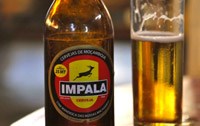Marketing & Media trends
Industry trends
BizTrends Sponsors
Trending





 Netflix reaches 40m users for ad supported planKarabo Ledwaba
Netflix reaches 40m users for ad supported planKarabo Ledwaba
Impala beer carving out a niche in cassava

It is packaged in a brown bottle and although it is brewed like a normal beer, its main ingredient isn't what you think it is.
Impala is brewed using cassava, a root vegetable that grows widely in Africa. The process of getting the plant to the manufacturing facility is vastly different from the "normal ingredients" for beer.
In northern Mozambique, in what appears to be the middle of nowhere, stands a mobile cassava processing unit. It is here that about 1500 smallholder farmers will bring their crop to be processed to make Impala beer.
At the site about 40 people busy themselves with the cutting and cleaning the cassava plant, readying it to feed into the machine that will turn it into a white cake to be used in the brewing process. Without this unit, the cassava would rot. Because of its high water content, it needs to be processed within 24 hours of being harvested.
The farmers take turns to bring their crops forward and are paid cash on delivery. Payment is about R700 a ton. Once it is peeled and washed and made into a starchy material, it can last about six months in its plastic bag.
The cassava processing unit is key to the process and is run in association with the Dutch Agricultural Development & Trading Company, the International Fertiliser Development Centre and the Netherlands' directorate-general for international co-operation.
The rapid deterioration of the root has kept it a subsistence product, until now.
SABMiller and the creators of the processing unit are attempting to change cassava from a subsistence crop to a cash crop. For SABMiller's local subsidiary, Cervejas de Moçambique, the cassava beer gives the company a chance to compete in the lower end of the market and merges local farmers into the supply chain.
The beer costs about 70% less than mainstream beer so it can compete in both the illicit alcohol market and the home-brew market. The home-brew market is estimated to be four times the size of the mainstream market. Cervejas de Moçambique MD Grant Liversage says the company aims to make Impala about 10% of its total portfolio. "This would take time, the supply chain would need to be developed. This could possibly happen in three to four years.
"As it stands the crop takes about a year to grow to maturity. So to develop the concept will take a few cycles." Now farmers are contracted to sell their cassava crops to the company.
At the moment, the company is selling about 11000hl of Impala. But, Mr Liversage says, the concept could be taken to other countries where cassava grows.
"The main challenge to working with cassava is that the crop deteriorates and must be used as soon as it is harvested.
"We would like to catalyse the commercialisation of the crop, so we eventually become a customer of the farmers."
Almost half the alcohol made on the continent outside SA was made at a "subsistence" level, SABMiller CEO Graham Mackay said at the launch of the product late last year. This was a market that paid no tax and had no quality control, he said. "We always looking for new markets and opportunities."
The investment in the beer may already be paying off. The company said in January that third-quarter sales increases in Africa and South America offset poor results reported for US and Europe.
It grew lager volumes by 11% in Africa in the third quarter, despite strong comparatives (third-quarter volumes grew 12% a year earlier) and capacity constraints in a number of markets.
"The newly launched Impala brand ... notched volumes up by 8% in Mozambique," it said.
There are also other products brewing for the company - Chibuku, another traditional product, has begun production and sales are rising, the company says.
Source: Business Day
Source: I-Net Bridge

For more than two decades, I-Net Bridge has been one of South Africa’s preferred electronic providers of innovative solutions, data of the highest calibre, reliable platforms and excellent supporting systems. Our products include workstations, web applications and data feeds packaged with in-depth news and powerful analytical tools empowering clients to make meaningful decisions.
We pride ourselves on our wide variety of in-house skills, encompassing multiple platforms and applications. These skills enable us to not only function as a first class facility, but also design, implement and support all our client needs at a level that confirms I-Net Bridge a leader in its field.
Go to: http://www.inet.co.za


